 |
|||||
|
|||||
| Preview of Stamps Catalogue: VOLUME 1 |
 |
|||||
|
|||||
| Preview of Stamps Catalogue: VOLUME 1 |
Return To Catalogue - Egypt 1867 issue - Egypt 1866 issue - Egypt 1879-1920 - Miscellaneous - Suez Canal Company
Note: on my website many of the
pictures can not be seen! They are of course present in the catalogue;
contact me if you want to purchase it.
5 pa brown 10 pa lilac 20 pa blue 1 pi red 2 pi yellow 2 1/2 pi lilac 5 pi green
For the specialist: These stamps have watermark 'Star and Crescent'. Remainders were cancelled to order and sold to dealers (if anybody posesses more information, please contact me!). Two printings made by two printers were made, the first one by Penasson (Alexandria), usually quite clear, and the second one by the state printers in Bulak, usually blur.
Value of the stamps |
|||
vc = very common c = common * = not so common ** = uncommon |
*** = very uncommon R = rare RR = very rare RRR = extremely rare |
||
| Value | Unused | Used | Remarks |
| 5 pa | ** | ** | With inverted values: * (see example below) |
| 10 pa | * | * | |
| 20 pa | ** | * | |
| 1 Pi | * | c | |
| 2 Pi | * | * | |
| 2 1/2 Pi | * | * | |
| 5 Pi | *** | *** | |

(Inverted values)
Surcharged (1879, only used in Alexandria and Cairo)
'5 paras' on 2 1/2 Pi lilac '10 paras' on 2 1/2 Pi lilac
Value of the stamps |
|||
vc = very common c = common * = not so common ** = uncommon |
*** = very uncommon R = rare RR = very rare RRR = extremely rare |
||
| Value | Unused | Used | Remarks |
| 5 pa on 2 1/2 Pi | * | * | Exists with inverted surcharge: RR |
| 10 pa on 2 1/2 Pi | * | * | Exists with inverted surcharge: RR |
Stamp used in Constantinopel (Turkey):
Between 1866 and 1879 Egypt had the following post offices abroad: Beyrut, Dardanelles, Gallipoli, Harare (Ethiopia), Jaffa, Cavalle, Constantinopel, Lagos, Latakia, Massaua, Mersina, Mytilenos, Rhodos, Salonici, Smyrna, Tenedos, Tripoli and Volo (Greece). There were also many egyptian post offices in Sudan.

Italian text 'V.R. POSTE EGIZIANE' and townname; date in the
center. 'V.R.' means 'Vice Reali'. This cancel type appeared
first in 1869.

Circular postmark with Italian text 'POSTE KHEDEDUIE EGIZIANE'
and townname in the outer part, date in the center. This cancel
type was introduced in 1873.

Circular postmark Italian text 'POSTE EGIZIANE' with townname at
the bottom and date in the center. This postmark type was
introduced in 1874.
For more info on postmarks see: http://www.egyptstudycircle.org.uk/post_marks.html.
Forgeries exist of these stamps:

A Spiro sheet with 25 forgeries of the 2 Pi value
I think the above stamps are Spiro forgeries. I do not know what the distinghuishing characteristics of this forgery are. The cancels look quite 'bogus': arrays of dots and patterns of lines. I have seen sheets with 20 pa, 1 Pi, 2 Pi and 2 1/2 Pi stamps cancelled with typical Spiro cancels (see image above for an example). I think these forgeries were also offered by Fournier in his 1914 pricelist (7 values for 2 Swiss francs) as second choice forgeries. The next picture shows a forgery with overprint 'FAUX', probably coming from a Fournier Album, that was made after Fourniers forgeries were bought over by the Philatelic Union of Geneva:

(Forgery with 'FAUX' overprint)

Page from a Fournier Album with Fournier forgeries.

Some forged overprints made by Fournier, images taken from a
'Fournier Album' (reduced sizes)
Fournier made the forged cancels "EBNOUB" or "SEDFA 26 MAI or 30 I" (interchangeable numbers according to the Serrane guide).

SEDFA and EBNOUB forged cancels made by Fournier, reduced sizes.
I've seen the SEDFA forged cancel being used on a forged 5
Piaster postage due stamp.

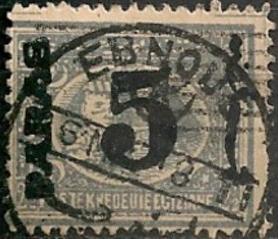
Here two 'enchanced' Spiro forgeries (the cancels can still be
seen). They have been improved by Fournier probably, one of them
has the forged 'EBNOUB' cancel.
Other forgeries:





Note the strange head of the sphinx in these forgeries; I have
also seen the values 10 pa and 20 pa of this particular forgery.
Also a 5 pa with a "853" numeral cancel (with 6
horizontal bars in an ellipse). The moons in the corners are much
longer and thinner than in the genuine stamps.


I've seen a whole sheet of forgeries of this value (6 rows of 7
stamps), they have the "1"'s in the corners different
from the genuine stamps. When zoomed-in the design consists of
small dots.
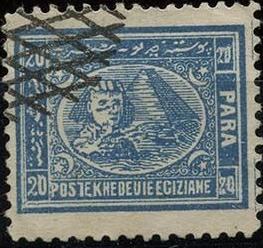
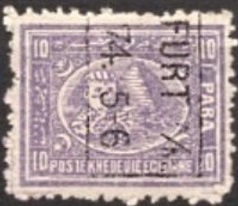
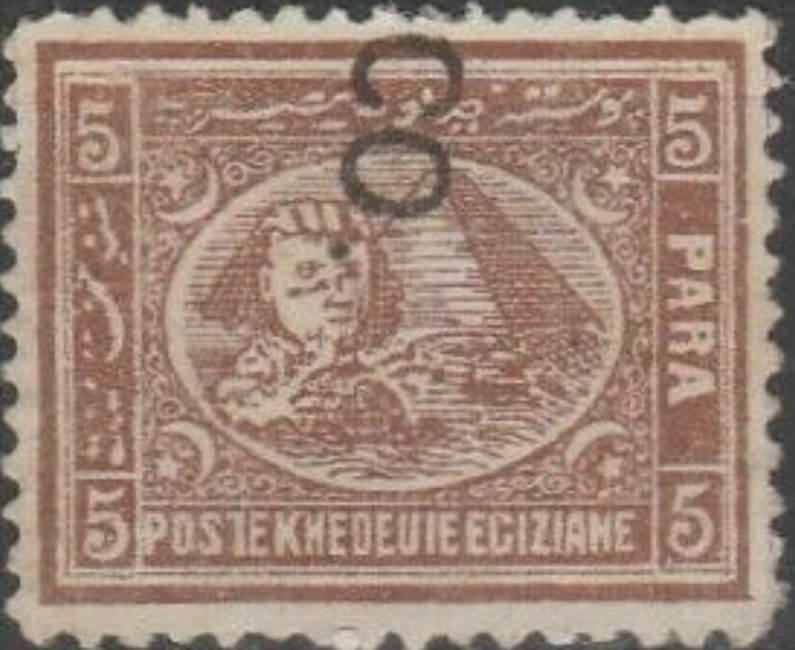
Forgery with very small upper right "20" and a grill cancel. Also a forgery with a
"FRANKFURT" cancel
and part of a "FRANCO."
cancel.

And another primitive forgery of the 20 p value, especially the
face of the sphinx is very badly done



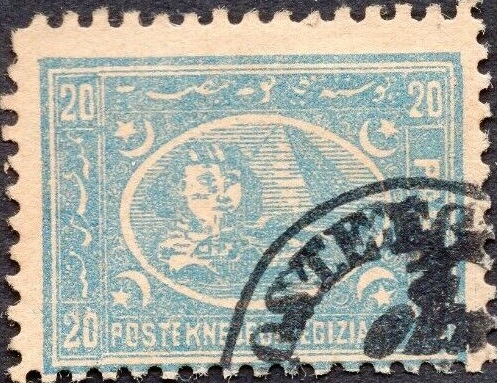

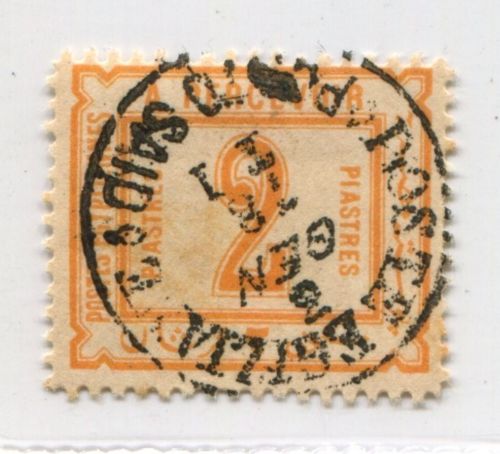
Highly dubious items, with "POSTE EGIZIANE PORTO SAID 3 GEN
78 T1" cancel, which can also be found on many forged
postage due stamps.
For stamps of Egypt issued from 1879 to 1920, click here.